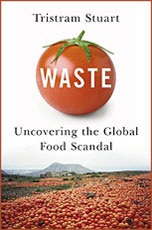Here are some startling statistics from this hard-hitting report on food waste by farmers, manufacturers, supermarkets, and consumers:
• Around half of all food in the United States is wasted, while 35 million Americans live in households that do not have access to adequate food.
• The United States has more than four times the amount of food required by the nutritional needs of the population.
• Just half the food currently being thrown away in the United States could feed the world's nearly one billion malnourished people.
• If trees were planted on all the land currently being used to grow unnecessary surplus and wasted food, they could offset between 50 to 100 percent of the world's man-made greenhouse gas emissions.
• Only 2.6 percent of municipal food waste is recycled.
Tristram Stuart has been a freelance writer for Indian newspapers and has made regular contributions to television documentaries, radio programs, and newspapers on the social and environmental aspects of food. As a student, he fed himself on what food shops and supermarkets threw away. To this day, Stuart lives largely on what is discarded by others, as well as the food in his vegetable patch. That is why he is outraged over the ways in which British supermarkets do everything they can to prevent leftover stock from being eaten. Many of them have a policy of locking up food that is just past the sell-by date and disposing of it, instead of giving it to food banks or shelters for the homeless.
Then there is the problem of waste in homes. It is estimated that American households waste more than one-quarter of their food. Having a well-stocked larder is the cause of this in many cases, but so is the laziness of letting food spoil or caving in to the desire to eat out at the last moment. Stuart believes that we all bear responsibility for the crisis today, and we can change things around by buying only the food we are going to eat and eating whatever we purchase. We can also learn to love leftovers, compost our peelings, and measure food proportions more carefully.
Another dimension of the problem is that forests are being destroyed to make room for food production. Nearly one-tenth of the West's greenhouse gas emissions is released growing food that will never be eaten. Stuart shares this analogy:
"Imagine living in a closed room with five other people. One of the people in the room is malnourished, and one of them is much richer and more powerful than everyone else. The rich person eats more than everyone else, and keeps aside enough surplus food to fatten his pigs and cattle. He is also very negligent with his food, hoarding it in his corner, and sometimes forgetting to eat it before it gets mouldy. He throws away more food than the hungry person needs to regain his health and strength."
Stuart has some cogent things to say about farmers who destroy crops they have grown, manufacturers who over-produce, using surplus food to feed livestock, the wasteful discarding of fish by the fish industry, the urgent need to stop sending surplus food to landfill, bringing back the practice of gleaning, and upgrading recycling programs.
